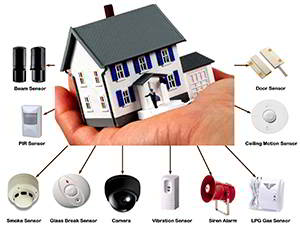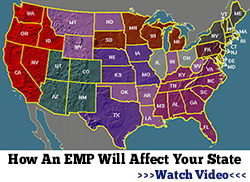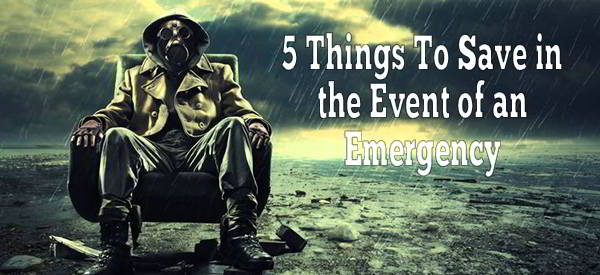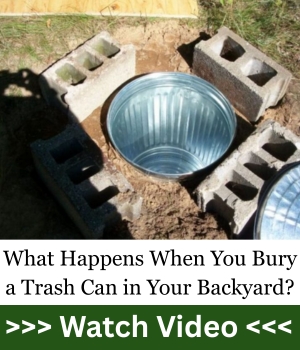by Cameron Smith
In the United States alone, more and more individuals and families alike are starting to understand the importance of being prepared. Whether this is in the event of an emergency, or facing various cases of natural disasters, having a disaster plan for you and your family is absolutely crucial. This may seem obvious to some, but for others, they may have difficulty realizing which things are worth protecting, stockpiling, and especially saving.
What to save is an area of focus that goes far beyond the family photos and keepsake items. It is also something that should be considered for a multitude of circumstances and natural disasters. Even though fires are incredibly common (there were over 1.3 million reported last year), they are not the only disaster that can strike a family. Floods, tornadoes, loss of power, earthquakes, and even break-ins can just as easily devastate a home.
In light of National Preparedness Month, here are a handful of tips on what to save and protect during an emergency, and even how to prepare yourself and your household. The following categories will take a deeper look into what to include and why. Use this as a guide, or a preliminary check list when you are ensuring the safety of you and your family.
Legal: Documents such as passports, licenses, social security cards, and birth certificates
- Identification, especially in this day in age, is extremely important. In light of a catastrophic disaster, your access to transportation, medical aid, and other public services could be hindered if you fail to provide one of these forms of identification. Also, in the event that one of these forms are stolen during a break-in, your family is now extremely vulnerable to identity theft for what can easily be several years. Not only can this lead to feelings of discomfort and perpetual worry, but it can even have a devastating impact on your family’s financial security. Other types of documentation to consider are insurance policies, wills, health records, and financial documents.
Monetary: Bank information as well as a security fund
- Everyone, individuals and families alike, should have an emergency fund that will last a minimum of six months. Emergency funds are best made up of guaranteed investments such as savings accounts, as opposed to stock portfolios. Many individuals even elect to establish both short-term and long-term funds. While the short-term fund can be for less-serious emergencies like car repairs, the long-term fund is for major emergencies and disasters. The information for these accounts, and all other financial accounts for that matter, should be stored someplace safe and secure. If you do not already have them, consider purchasing a fireproof safe or obtaining a safety deposit box.
Protection: A smart home security system
 It is almost impossible to prepare for all disasters, but what you can do is take a few preventative measures that are easy, affordable, and protect your home from a wide variety of disasters. One such measure is investing in a comprehensive, wireless security system much like this one. It will protect your home against everything from the obvious break-ins, to fires, floods, and below-freezing temperatures. These systems provide constant monitoring whether you are at home or away, and can save you a lot of heartbreak and headaches along the way as well. Having peace of mind that you and the proper authorities will be alerted in the event of an emergency is immeasurable.
It is almost impossible to prepare for all disasters, but what you can do is take a few preventative measures that are easy, affordable, and protect your home from a wide variety of disasters. One such measure is investing in a comprehensive, wireless security system much like this one. It will protect your home against everything from the obvious break-ins, to fires, floods, and below-freezing temperatures. These systems provide constant monitoring whether you are at home or away, and can save you a lot of heartbreak and headaches along the way as well. Having peace of mind that you and the proper authorities will be alerted in the event of an emergency is immeasurable.
Practical: Survival supplies such as non-perishable food items, batteries, and medications
- Disaster emergency kits are simply a collection of the important items an individual or family needs during the event of an emergency or disaster. These kits should be kept in a couple places around the house, and perhaps even a place of work. They should contain at least one gallon of water per person, three-day supplies of nonperishable food, clothing, a battery-powered radio, flashlight, extra batteries, basic tools, maps, and even necessary medications. This will allow you, and/or the members of your family, to not rely solely on aid relief. It will also provide you with the ability to stay put, as opposed to venturing out into a potentially dangerous environment.
Related: Best 10 Foods to Store Long Term (up to 60% discounts)
Tactical: An emergency plan for the evacuation and reunification of family members
- The American Red Cross recommends developing a preparedness plan, unique to you and your family, that both prepares and informs in the event of a disaster or an emergency. It is also recommended to choose two separate meeting places outside of the home. One should be immediately outside of your house for sudden disasters, such as a fire. The other meeting place should be outside of your neighborhood to cover the chance of there being a mandatory evacuation. This also brings up the point that an evacuation plan should be put in place, practiced, and executed efficiently by family members at least once a year.
Sentimental: Protecting family keepsakes
- All of the categories mentioned above take into account the functionality and preservation of you and your family after a disaster strikes. It’s also worth mention though, that aside from straight survival, comfort and solace can be important as well. It’s not a bad idea to also find a safe place for any emotional mementos worth protecting. Family photographs, for example, can be kept safe by creating a digital copy.
Emergencies and disasters happen throughout the United States on a daily basis. There are mudslides and wildfires in the Pacific Northwest, tornadoes in the Great Plains, and hurricanes in the South. In fact, every single year, our country spends billions and billions of dollars recovering from the losses incurred by these catastrophic events. Because of this, it is our responsibility to be as prepared as we possibly can.
Whether it’s a sudden disaster like break-ins and fires, or natural disasters like floods and tornados, they can happen to us all at any time. Make sure your family has a plan, is safe and secure, and ready for anything during National Preparedness Month. Taking a few easy steps can have lasting impacts on your family’s health, security, and happiness.
You may also like:
How To Disappear Completely When SHTF

This Bug Will Kill Most of the Americans during the Next Crisis (Video)
15 Common Mistakes That New Preppers Make















We must not be talking about a full blown SHTF type of emergency here if the author is recommending safety deposit boxes. When the ATM’s stop working, it’s highly unlikely that banks will even be open.
Not only that, even if the bank is open, many of the locking devices banks use today depend upon electricity. The bank operations manager might not be too happy if you decide to take a hacksaw to the iron bars securing the safety deposit box vault because the electric lock won’t open with the power off. In addition to which it is going to take you a long time to cut off enough bars with a hand hacksaw to be able to gain entry into the vault.
That is one drawback to electronically locked gun boxes and safes. If you don’t have a way of mechanically opening the safe in an EMP or CME event, you are going to be on the outside wondering how hard it is going to be to cut into the safe with your hand hacksaw and cold chisel and hammer.
Kurmudgeion. u are completely correct. The banks will lock out all safety deposit boxes at first sign of SHTF. u will not be able to get anything out from them for a long time…….
Thank you for publishing things that most people wouldn’t think of until they need it and it would be to late.
You have helped me a lot.